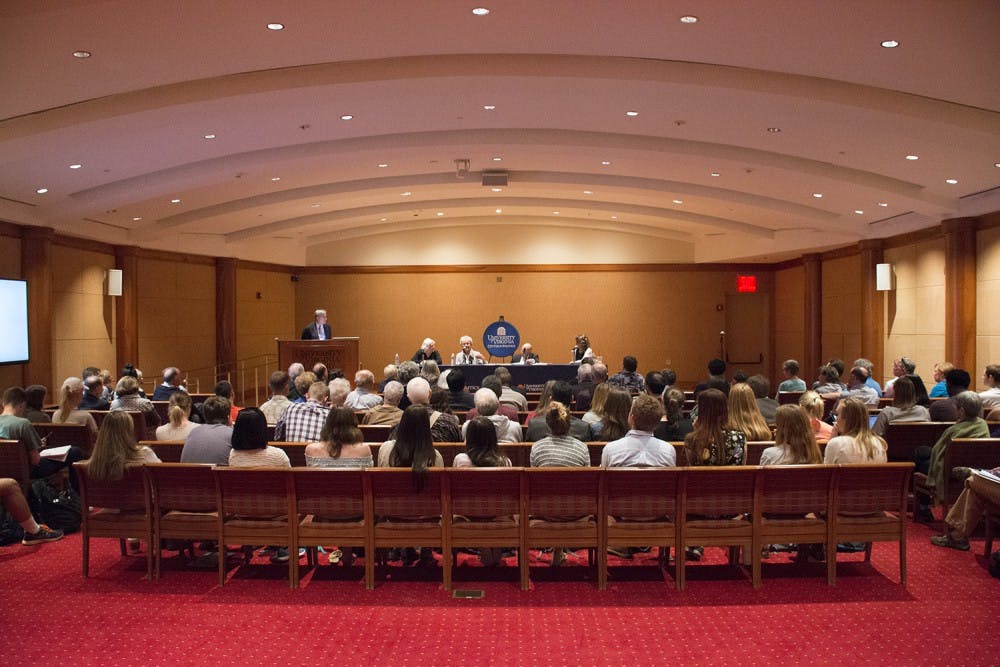The University’s Center for Politics joined with the Media Studies department to host a panel about former President John F. Kennedy’s relationship with the media on Wednesday night as part of the “JFK100” series of events celebrating what would have been Kennedy’s 100th birthday this year.
“JFK definitely knew how to use the media to his benefit,” said Glenn Crossman, director of programs at the Center for Politics. “He did change the number of the press who could get in [the White House press corps] from 50 to 250. He really welcomed the press in.”
The panel took place in the Special Collections Library in front of a packed crowd of students and community members. It was led by Politics Prof. Larry Sabato and featured Media Studies Prof. Aniko Bodroghkozy, former White House Correspondent Sid Davis and two former Kennedy White House Aides, Nancy Hogan Dutton and Sue Mortensen Vogelsinger.
“One aspect of the Kennedy legacy that has remained constant over time was dealing with the media and crafting a public image,” Sabato said. “He was a steady, likable leader who skillfully led the nation through a series of domestic and foreign crises.”
Dutton and Vogelsinger discussed their experience with social issues of the 1960s when they worked in the White House. They agreed that civil rights took priority to women’s rights issues, and faced instances of gender discrimination.
“There was a White House mess that was open to men only, and three women … the rest of us were not invited to eat in the White House mess,” Dutton said. “There was a saying that the Kennedy’s thought women should stay in the bed, in the parlor, in the kitchen and behind the typewriter. And I think there was truth to that.”
The panelists repeatedly emphasized Kennedy’s close relationship with the media, and his remarkable ability to promote himself to the public through a new medium of the time — television.
“JFK is often referred to as the ‘first television president,’” Bodroghkozy said. “He charmed both the press, but more significantly the audience that watched on television.”
One instance that was discussed to illustrate Kennedy’s masterful use of the media was the first Nixon vs. Kennedy debate of the 1960 election, in which Nixon’s refusal to wear makeup made him appear significantly weaker than his young opponent.
“Kennedy came across as … visually presidential, and looked good. Nixon on the other hand came across as if he were at death’s door,” Bodroghkozy said. “He charmed both the press, but more significantly the audience that watched on television.”
The panel also discussed the difference between political coverage in Kennedy’s era versus today.
“To say there would be no comparison would be unfair,” Davis said. “You didn’t have the internet with people who call themselves journalists … a lot of distractions are political that you didn’t have in the old days.”
Davis spent more than 40 years as a political journalist. He was also a part the motorcade in Dallas when JFK was assassinated, and was one of the few members of the press who witnessed Johnson getting sworn in on Air Force One. Additionally, he was the only member of the press in the Oval Office when Kennedy addressed America about the Cuban Missile Crisis.
“I can’t say there weren’t planted questions, because there were, planted by [Press Secretary] Peter Salinger,” Davis said. “John Kennedy’s style was one that the country had never seen before. News conferences became Kennedy’s way of communicating with the American public.”
Dutton offered a slightly different perspective from her experience as a White House aide who was often on the receiving end of reporters’ questioning.
“One contrast with the media today was we didn’t ‘spin,’” Dutton said. “We thought if we were open and honest to the reporters, they would be open and honest to us.”
Sabato also had a response to comparisons of political coverage from the 1960s to today.
“It’s better because we have so many more sources, many of them good sources on the Internet, even printed sources,” Sabato said. “What’s worse is people have segmented into ideologies and we no longer have any more common conversations. We are living in parallel universes that never connect.”
Finally, the panelists took time to imagine Kennedy in the context of the current political media climate. According to Crossman and others, Kennedy would have been a masterful social media user.
“Imagine what President Kennedy could have done with Twitter,” Sabato said. “Probably he was smart enough not to use it.”







